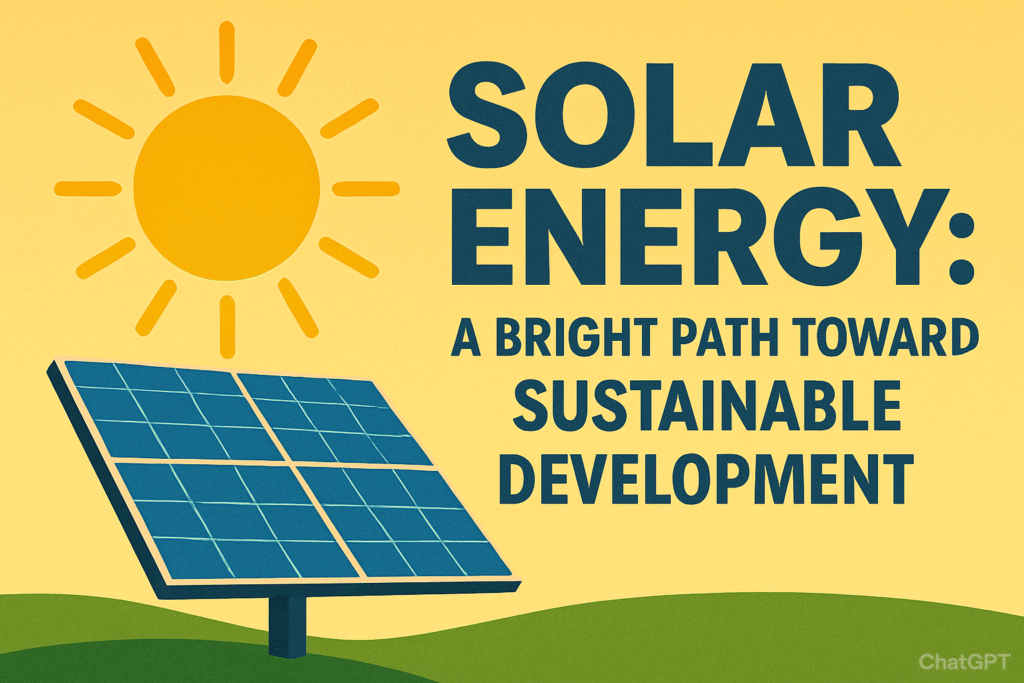As the world’s population and energy demand continue to grow, traditional energy sources such as fossil fuels are becoming increasingly unsustainable. These fuels are not only limited in supply but also harmful to the environment, contributing to air pollution and climate change. In response, the global community is turning toward renewable energy sources — and among them, solar energy stands out as one of the most promising solutions.
Solar energy is clean, abundant, and renewable. It comes directly from the sun and can be harnessed using technology to produce electricity and heat. As we look toward a sustainable future, solar power offers a path forward that is both environmentally friendly and economically viable.
🌞 How Does Solar Energy Work?
Solar energy is harnessed through two primary technologies:
- Photovoltaic (PV) Systems
These systems convert sunlight directly into electricity using solar panels.
When sunlight hits the photovoltaic cells in a panel, it generates a flow of electricity that can power homes, businesses, and devices.
- Solar Thermal Systems
These systems collect solar heat to perform tasks like heating water, cooking, or powering industrial processes.
They are commonly used for both residential and commercial applications.
✅ Advantages of Solar Energy
- ♻ Environmentally Friendly
Solar energy production emits no greenhouse gases or harmful pollutants.
It helps reduce the global carbon footprint and mitigates the effects of climate change.
- 💰 Cost-Effective Over Time
While initial setup costs can be high, solar systems provide free energy for years after installation.
They reduce or eliminate electricity bills, making them a smart long-term investment.
- 🏞 Accessible in Remote Areas
Solar systems are ideal for off-grid locations where traditional power infrastructure is unavailable.
They can bring electricity to remote communities, improving access to education, healthcare, and technology.
- ⚙ Low Maintenance
Solar panels require very little maintenance and have a long lifespan, typically 25–30 years.
Occasional cleaning and routine checks are generally sufficient to maintain efficiency.
- 🏠 Versatile Applications
Solar power can be used for lighting, fans, appliances, water pumps, communication devices, and even vehicles.
It supports both small-scale residential use and large-scale industrial or agricultural needs.
- 🌍 Combats Global Warming
Solar energy reduces dependence on fossil fuels, helping to lower global greenhouse gas emissions.
It plays a key role in the transition to a low-carbon economy.
🌐 Global Adoption of Solar Energy
Across continents, governments, businesses, and individuals are investing in solar energy as a central part of their energy strategy.
International climate agreements encourage the shift to renewables, and solar is leading the way due to its scalability and accessibility.
From individual rooftops to large solar farms, solar technology is rapidly expanding and becoming more affordable worldwide.
🔍 Interesting Facts About Solar Energy
In just one hour, the sun provides more energy to the Earth than humanity uses in an entire year.
Modern solar panels typically last 25–30 years with minimal performance degradation.
Solar power can be used for water purification, irrigation, street lighting, and even powering entire villages.
📢 Challenges and Opportunities
While solar energy offers many advantages, it still faces a few challenges:
High upfront costs can be a barrier, although prices are steadily decreasing.
Energy storage is needed to provide power at night or during cloudy days (battery systems help solve this).
In some regions, there is a lack of skilled technicians and public awareness about solar technologies.
With continued innovation, supportive policies, and global cooperation, these challenges can be overcome — paving the way for widespread adoption.
📝 Conclusion
Solar energy is more than just an alternative — it is a cornerstone of a sustainable future. It empowers individuals, supports economic development, and protects the planet. Whether used in homes, industries, farms, or remote areas, solar energy delivers clean, reliable, and cost-effective power.
As global citizens, embracing solar energy is not only a smart choice — it’s a necessary one. By investing in the sun, we invest in a brighter, cleaner, and more resilient world.
“Just as sunlight shines on all, solar energy can power a future that includes everyone.”




This artical will be very helpful for me to do my school homework
Good Information